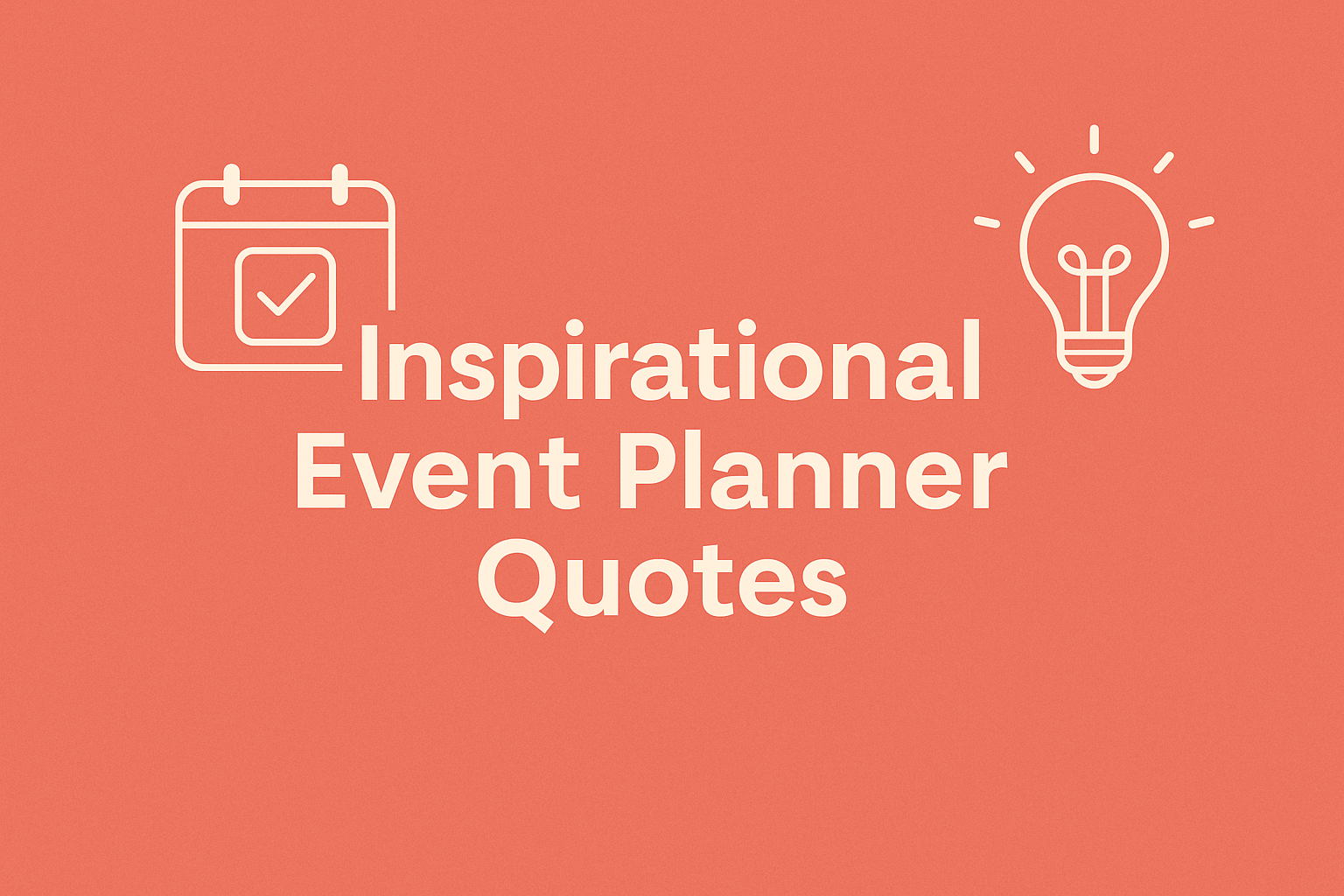Herding wild cats. Bottling a hurricane. Bringing order from chaos. Coordinators describe the seemingly impossible feat of creating an event from scratch in a variety of daunting ways. In fact, the independent educational resource World Scholarship Vault (WSV) named event planning as the third most stressful job in 2023. According to the WSV study, only military service personnel and healthcare workers experience higher on-the-job stress levels.
Therefore, first-time event coordinators and seasoned industry veterans alike need to take full advantage of all the proven methods and modern tools at their disposal if they want to position themselves for exceptional professional achievement. They also must realize that the journey to effective event planning starts with a dedicated and detailed event planning checklist.
Discover the essential steps to masterful event planning with our comprehensive checklist tips. From establishing clear and achievable event goals to coordinating final details and post-event analysis, this resource provides a wealth of practical insights for crafting successful events.
What Is an Event Plan?
At its heart, the definition of an event plan couldn’t be simpler. Essentially self-defining, it is a plan that details everything that a coordinator needs to create and execute an event. However, the particulars of each event plan are (or, at least, should be) quite varied, extremely intricate, and specifically tailored to meet the unique, individual needs of the client and the event that they want to bring to life. The relative complexity of these plans is reflected in the many different definitions of event planning as a practice.
The International Institute of Event Management presents a handful of event planning definitions, including an official one from the US Dept of Labor (“event planning consists of coordinating every detail of meetings and conventions, from the speakers and meeting location to arranging for printed materials and audiovisual equipment”) and a far more colorful and encouraging one from the IIEM itself (“event planning is the energizing art of choreographing people and activities in order to create a show that creates memories of a lifetime”). It is important to incorporate your unique attitude and approach to event coordination within your event plan.
Establishing Your Event Goals and Objectives
It is never too early to begin formulating your event plan. After all, a good plan will guide you through every stage of event development and execution. But no plan can get off the ground without a relevant and guiding set of goals. Just as world travelers who voyage without a destination in mind will never get where they want to go, coordinators without clear goals for their events are unlikely to deliver desired results.
So before you can detail all that must be done on your event checklist, you must fully understand why you are doing it and clearly communicate those objectives to your team members and other key stakeholders. When identifying both the core reasons behind and the performance benchmarks to measure your event, it is important to set objectives that are SMART (Specific, Measurable, Achievable, Relevant, Time-Bound). Common types of goals for events might include the number of attendees, the amount of information delivered, or the total profit accumulated.
Event Planning Checklist
After you have clearly defined your overarching objectives, you are ready to begin planning your checklist. In fact, as you write, revise, and refine your checklist, you may want to post your principal goals at the top of each page, to ensure that you remain firmly on track to achieving them. From charting initial logistics and operations to generating public excitement about your event, the items on an effective event plan checklist should reflect the specific needs and unique demands of the situation at hand. A good checklist will also include post-event elements such as completing statistical research, soliciting feedback, and maintaining ongoing client communications.
As you proceed through your event planning checklist, you will…
Set a Budget
It may be difficult or even impossible to finalize a firm budget before undertaking key event planning considerations such as venue selection and program creation. However, you must begin your checklist by developing a rough budget using estimates and educated guesses if necessary. It may be helpful to research the costs associated with past events that were similar to yours.
The important thing here is to come up with an immediate budgetary baseline that you can alter and refine throughout the early stages of the event planning process. Call vendors to get cost estimates and begin searching for sponsors to determine available resources. As you continue to work through your event planning checklist, you must allocate funding for each item on it. Always remember that you can stretch each dollar much further if you manage your resources effectively.
Choose a Date and Time
As the old saying goes, timing is everything. If you want to position your event for success, it is extremely important to schedule it for the right date and time. Think about your target audience. When will they be available to attend, and when will they be most excited about attending your event? Think about factors that range from relevant seasonal concerns to potential scheduling conflicts.
You will want to select an event date that leaves you a reasonable time frame for planning and preparation, but it shouldn’t be too far in the future either. After all, it is difficult to sustain enthusiasm for an upcoming event over an extended period of time. Furthermore, projects without impending deadlines have a nasty habit of running out of steam before completion. While you will certainly want to choose an optimal date and time for your event, you will likely need a “plan B” schedule that you can present as a backup to event sponsors and other stakeholders.
Select a Venue
With a rough budget and time frame for your event in mind, you can begin to plan for the necessary logistics and infrastructure. First and foremost, this means choosing a suitable event venue. Of course, you need a venue that you can afford and that will accommodate your intended audience. However, you should also find a venue that matches the specific theme and/or general spirit of your event. While a dark cavernous space might be great for a rock concert, it would be disastrous for an elegant wine tasting.
Other factors to consider when selecting a venue include helpful on-site amenities, available parking, proximity to public transportation, and general ease of accessibility. You will also want to ensure that the location is approved for any permits and/or licenses you must have for your event.
After you choose a promising venue, meticulously detail every one of your expectations in a comprehensive service level agreement (SLA) that will take the guesswork out of the contract negotiation process. From equipment delivery to required staffing, your SLA should include every general responsibility and specific task that the venue will provide. You may need to secure certain accommodations from providers that the venue doesn’t provide. This might include arranging catering services, admitting retail vendors, and/or bringing in tech specialists.
Plan Your Marketing and Promotion Strategy
Now that you know when and where it will take place, you can begin creating an appropriate and strategic promotional campaign for your event. Start by establishing a logical framework and direction for your marketing efforts with both the event sponsor and audience firmly in mind. In addition to honing your promotional messaging and communication materials, you must determine the best traditional and nontraditional media channels to get the word out. Depending on your target consumer, you may want to send out a standard press release to any number of print and broadcast media outlets. Conversely, you may choose to concentrate on digital marketing by creating a comprehensive event website, sending out mass promotional emails, posting on relevant social media sites, and developing mutually beneficial influencer partnerships. It is also a good idea to connect with bloggers and journalists that cover subjects related to your event and its audience base. No matter what shape your final marketing and promotion campaign happens to take, it should be centered around a compatible brand image that captures both the spirit of the event and the attention of your target audience.
Plan Your Event Program
As you refine your marketing messaging, you should concurrently structure an event program that is worthy of spirited promotion. This typically means developing a desirable lineup of performers, speakers, and/or presenters for your event. While it can certainly be helpful to populate your event program with popular groups and individuals who have raw charisma and/or celebrity status, you must place a higher value on those that directly support your event objectives and strongly resonate with your target audience. For industry events, this means finding presenters who engage with your event theme, command industry respect, boast impressive professional/academic backgrounds, and possess high levels of expertise. Find the right mix of presenters, sessions, entertainment, and interactive elements to deliver a seamless and captivating event experience.
After creating a wish list of your dream performers, speakers, and/or presenters, you must reach out to them strategically, explaining your event as well as the specific benefits that it will provide. This is typically best accomplished through an official email that provides contact information, encourages incoming questions, and solicits direct feedback. Methods of generating excitement and encouraging involvement range from promises of relevant exposure to payment of speaker fees. Other particulars to negotiate range from travel and accommodation concerns to presentation materials and technological requirements.
As you begin to fill your program roster, you must pay close attention to coordination and scheduling. In fact, you may want to run different versions of your schedule by different event team members who will be managing different tasks. For example, security professionals will concentrate on the best times for VIPs and attendees to enter, while custodial staff will have various setup and cleanup concerns.
Coordinate Final Details
Just as the marathon runner must take care not to lose steam during the final strides toward the finish line, the event coordinator must pay meticulous attention to the final stages of the event planning process. You simply cannot afford to let months of painstaking preparation go to waste by failing adequately organize last minute logistical and communications matters. Furthermore, you will want to put various contingency plans in place to ensure flawless execution on the big day. Tie up all loose ends by finalizing your schedule, confirming details with contractors, updating sponsors with registration numbers, advising staff members on technical matters, and generally putting the final touches on your ideal event.
Anticipate Your Post-Event Analysis
As the date and time of your event looms closer and closer, you are bound to envision that day over and over. This is both natural and appropriate. However, a good event checklist can help you remember that event coordination doesn’t come to an end when the attendees go home. In fact, post-event analysis and feedback collection is incredibly valuable, so you need to set the stage for it well before the event itself. Because anyone can rewrite history to claim a victory, you must measure the success of your event according to predefined metrics. For example, if you fail to meet the quantitative benchmarks baked into your event goals (drawing “x” number of attendees or generating “x” dollars in ticket sales), you can determine exactly why, make appropriate adjustments, and perform better during your next event planning project.
Event Planning Tips
As you create and refine your comprehensive and customized event checklist, you can make the planning process quite a bit easier and more effective by adhering to a few key best practices. Protect yourself against potential hardships and solve common problems proactively by considering the following actionable advice:
Do a Post-Event Review
Given the supreme importance of post-event analysis, it is beyond foolish to end your event without a thorough review. Using a range of qualitative and quantitative assessment methods, you must evaluate your performance as an event coordinator to learn from your successes as well as your failures. Armed with this knowledge, you will be far better positioned to refine your event checklist strategies for future events.
In fact, it is a good idea to put together a checklist just for your post-event review procedure. At A2Z Events, we consider sending a thank you note to your client and requesting feedback from attendees, staff, and vendors to be essential items on our ultimate post-event checklist for event planners. Other common agenda items for a post-event review include collecting event photos for publication and reconciling event profits and expenses with your established budget and objectives.
Use Event Planning Templates
As previously discussed, event coordination is one of the most stressful occupations you can pursue today. So, if you are committed to traveling this highly rewarding, incredibly fun, but often overwhelmingly challenging career path, you need all the resources at your disposal to help you on your way. For many, this means taking advantage of some of the many standardized event planning templates that are available today. These handy templates can not only light your way through the event planning process but save you considerable time and countless headaches. Streamline your event checklist development with a clean, comprehensive, and professionally designed template that allows you to add your own sponsor, partner, and attendee names and other key details. Many of these templates allow for tremendous customization, promoting the development of events that are both highly personal and on-brand. Organizations such as ClickUp and SmartSheet even offer quality event planning and event checklist templates for download free of charge.
Use Event Planning Tools
Fortunately, the downloadable template is just one among many kinds of digital event planning tools that are available to modern event coordinators. But the sheer number of tools on the market today can be a bit overwhelming if not absolutely intimidating. By beginning with the essentials and building according to your unique wants and needs, you can easily find a suite of in-house software and/or online applications that work for you.
First and foremost, any business that deals regularly with customers or clients can benefit from an appropriate customer relationship management (CRM) platform like Salesforce or Hubspot. Event coordinators will also want to consider digital tools for registration transactions, attendee experience, contracting/sponsorship management, floor plan management, and event revenue generation.
Conclusion
From establishing a budget to performing post-event analysis, make sure that you cover all the necessary items on your customized event planning checklist. If you want to meet your target objectives and overall goals, you simply must develop and present your event systematically and strategically. And if you want to develop and present your event systematically and strategically, you owe it to yourself to make a comprehensive and applicable event planning checklist. Innumerable event coordinators will tell you that a good checklist is the key to creating events that are both impactful and successful.










